‘Doctor Who’ rewatch: Season two ranked
David Tennant's arrival shakes up the show for better and for worse
Welcome to Girl Culture, the newsletter where Caroline Siede examines pop culture, feminism, and more. Learn more about Girl Culture’s mission here
Maybe more so than any other season of Doctor Who, season two is the one I struggle to sum up in a straightforward way. Unlike Christopher Eccleston and Matt Smith, who emerged fully formed as their respective Doctors, David Tennant takes a minute to find his feet in the role, and it’s both fascinating and a little jarring to watch that process unfold. Indeed, in a lot of ways, the Tenth Doctor doesn’t fully become himself until he’s shaped by the loss of Rose. But, of course, you need this season they spend together to build to that loss and make it so powerful.
If season one was about falling in love, season two is about being in a new relationship – with all the love, trust, jealousy, support, chemistry, codependence, and over-the-top giddiness that entails. But while Tennant and Billie Piper so often get that balance achingly right, you can sometimes feel the show forcing their chemistry rather than letting it unfold naturally, as Piper and Eccleston’s did. Even more so than in season one, there’s a sense of effortful trial and error to this season, as the show figures out how it wants to evolve to suit its new Doctor.
Still, even if this sophmore outting isn’t perfect, it’s a deeply formative season for Doctor Who. And here’s my (frankly, very uncertain) ranking of its episodes.
LOWER TIER
11. “Fear Her” (season two, episode eleven)
Maybe the best way to sum up the mixed bag of season two is that my least favorite episode of the season contains one of my all-time favorite Tenth Doctor moments; the way he casually reveals “I was a dad once” to a shocked Rose. But as was the case in season one, the (close-to) present day episodes of the Russell T Davies era just don’t really shine the way the historical romps and sci-fi adventures do. Like most of season two’s weaker episodes, “Fear Her” isn’t bad exactly. It’s just underbaked and a bit oddly paced — like a first draft that could’ve used a few more passes to really bring its themes and characters to life.
10. “Tooth and Claw” (season two, episode two)
Monks do kung-fu in a werewolf story featuring Queen Victoria. Yeah, “Tooth and Claw” is a lot. And while I know it has its fans, it’s an episode that’s never quite worked for me. There’s something about the icy sleek action direction from Euros Lyn that makes it feel less like a Doctor Who episode than a pre-existing story idea that Rose and the Doctor got shoved into. To her credit, guest star Pauline Collins brings a welcome amount of dignity to her mournful take on Queen Victoria. But the episode around her alternately tries too hard to be funny and too hard to be scary without really achieving either.
9. “The Idiot’s Lantern” (season two, episode seven)
I debated long and hard about whether to put this episode below “Tooth and Claw,” but ultimately “The Idiot’s Lantern” has that classic Doctor Who feel I’m looking for, even if it has problems of its own. Yes, The Wire is too repetitive as a villain, the supporting characters don’t pop as well as they could, and the film noir-vibe is a bit ponderous at times. But it’s cute to see the Doctor and Rose done up in their 1950s outfits, the Queen’s Coronation is a fun setting, and the episode’s critique of patriarchal abuse is an interesting angle on the era. The pacing’s a bit off, but the pieces are there.
8. “New Earth” (season two, episode one)
My biggest problem with “New Earth” isn’t really about the episode itself, it’s about its placement in the season. On the heels of a Christmas special that separated Rose and the Doctor for most of its runtime, I think it was a mistake to launch the season with a body-swap comedy in which Rose spends most of the episode inhabited by returning season one antagonist Cassandra. Still, this is the episode that made me realize that Piper is a legitimately fantastic actor (see I Hate Suzie and Secret Diary of a Call Girl for further proof) and her weird, vibrant, funny take on Cassandra does a lot to make the premise work. Plus the story’s mix of wacky comedy and grim melancholy is boldly audacious, even if it only sometimes works.
THE PROBLEM CHILD
7. “Love & Monsters” (season two, episode ten)
Here’s the thing: If “Love & Monsters” didn’t end with its lovable female lead stuck as a slab of concrete, it would likely count as one of the sweetest, most inventive episodes of Doctor Who. But it does end with its lovable female lead stuck as a slab of concrete, and I just don’t know what to do with that. It’s a perfect summation of how RTD’s knack for writing quirky character dramedy can be hindered by his hacky sitcom impulses and a strange tendency towards unearned cruelty – both of which drag down this episode in its last 15 minutes. (Comedian Peter Kay’s weak guest performance doesn’t help either.) If any Doctor Who outing deserved a “just this once, everybody lives!” ending, it’s this one. And without it, it’s hard to know how to sum up the good with the bad.
SOLID TIER
6. “The Christmas Invasion” (2005 Christmas special)
I kind of think we don’t give “The Christmas Invasion” enough credit for its structural boldness. The Doctor spends the majority of the episode passed out in pajamas while Rose has an emotional breakdown and Harriet Jones (Prime Minister) briefly becomes the most active character in the story. It’s a choice that feels a bit maddening until 40 minutes in when the Tenth Doctor finally opens the TARDIS doors with a “Did you miss me?” and it becomes clear how much Davies was intentionally building a sense of confusion, frustration, and grief into NuWho’s first regeneration story. Like Rose, the audience needed a moment to mourn what we had with Eccleston before moving on to Tennant. And while “The Christmas Invasion” isn’t a perfect episode, I give Davies a lot of credit for handling such a major transition so thoughtfully – and setting the template for so many Christmas specials and regeneration episodes to come.
“No second chances, I’m that sort of a man.”
5. “Rise of the Cybermen” / “The Age of Steel” (season two, episodes five and six)
If there’s such a thing as a perfect filler adventure, “Rise of the Cybermen” / “The Age of Steel” qualifies. It’s not particularly ambitious on a thematic, aesthetic, or emotional level. But its parallel Earth story is consistently engaging and serves its characters well. After the awkward start of “New Earth” and “Tooth and Claw,” Piper and Tennant finally find the right kind of chemistry for Rose and the Doctor here. And it’s nice to see Mickey get his own hero arc for once. Add in the return of Shaun Dingwall as Pete Tyler and the introduction of the Cybermen, and you’ve got a really satisfying two-part sci-fi romp that lays some solid groundwork for the season finale.
4. “Army of Ghosts” / “Doomsday” (season two, episodes twelve and thirteen)
Like a lot of RTD finales, this one goes for a bigger-is-better approach, with a massive Cybermen vs. Dalek showdown that weaves together all sorts of different elements of the season and (mostly) pays off all those Torchwood teases. But the real grace note here is the absolutely devastating separation of Rose and the Doctor, which legitimately left my bereft for days the first time I watched it. Sure the Dalek/Cyberman sass off is fun, but it’s that final beach-set conversation that elevates this finale into something truly unforgettable. Rose Tyler is a cornerstone of what made NuWho work, and her goodbye set a heartbreaking template for companion farewells that I’m not sure the show has ever topped.
TOP TIER
3. “School Reunion” (season two, episode three)
Bringing back a character from the classic series in an unexpected way? Recontexualizing our understanding of the Doctor? “School Reunion” is to season two what “Dalek” is to season one. Only instead of exploring the Doctor’s intergalactic PTSD, it explores the PTSD of the companions he leaves behind. Maybe the greatest compliment I can offer “School Reunion” is that the first time I watched it, I had no idea Sarah Jane Smith was an actual companion from the classic series and I still found her story just as effective. That’s because Elisabeth Sladen’s performance is so phenomenal, it transcends the idea of “fan service” into something far more emotionally complex. Not only does Sarah Jane’s mournful tale inject some much-needed stakes into Rose and the Doctor’s relationship, her presence also really helps Tennant ground his take on the Doctor. In fact, Tennant and Sladen are so, so good together I’m even willing to overlook the bizarre Anthony Stewart Head/alien bat plot the episode ostensibly hinges on.
2. “The Impossible Planet” / “The Satan Pit” (season two, episodes eight and nine)
If there’s one thing I hope people remember from my time co-hosting a Doctor Who podcast, it’s my status as the world’s foremost fan of this particular two-parter. I don’t often hear “The Impossible Planet” / “The Satan Pit” listed among the all-time great Who episodes, but to me, they absolutely qualify. It’s a classic Doctor Who base-under-siege story elevated to an artform, with a memorable supporting cast, a creepy central threat, an effectively moody tone, the introduction of the Ood, and some of the best Doctor/Rose moments of the season. (“But if I believe in one thing, just one thing, I believe in her!”) It feels like Doctor Who: The Movie in the best way – somehow both harder sci-fi and more fantastical than Doctor Who usually does. And I’m here to preach its gospel.
1. “The Girl in the Fireplace” (season two, episode four)
Fans often cite “Blink” as the Steven Moffat-penned, RTD-era Who episode to show new viewers to hook them into the show, but I’d argue “The Girl in the Fireplace” is an even better option. It distills the Tenth Doctor’s entire tragic, brooding romantic hero thing down to a single episodic installment. And it balances its clever timey wimey shenanigans with the sort of character-driven pathos that feels so distinctive to this era of the show. (Plus it basically prototypes the entire Eleventh Doctor/Amy Pond dynamic.) If “School Reunion” is the episode where Tennant first starts to find himself as the Doctor, this is the episode where he completely snaps into the role. And of all the great companions-who-might-have-been, Sophia Myles’s Madame de Pompadour just might take the cake. From a season-long perspective, you could argue that Rose is a bit unfairly underserved here. But as a standalone installment of the Tenth Doctor’s era, I’m not sure it gets better than this.
Coming soon on Girl Culture: Doctor Who season three, ranked; a recap of my latest pilgrimage to Broadway; a review of The Marvels, and more









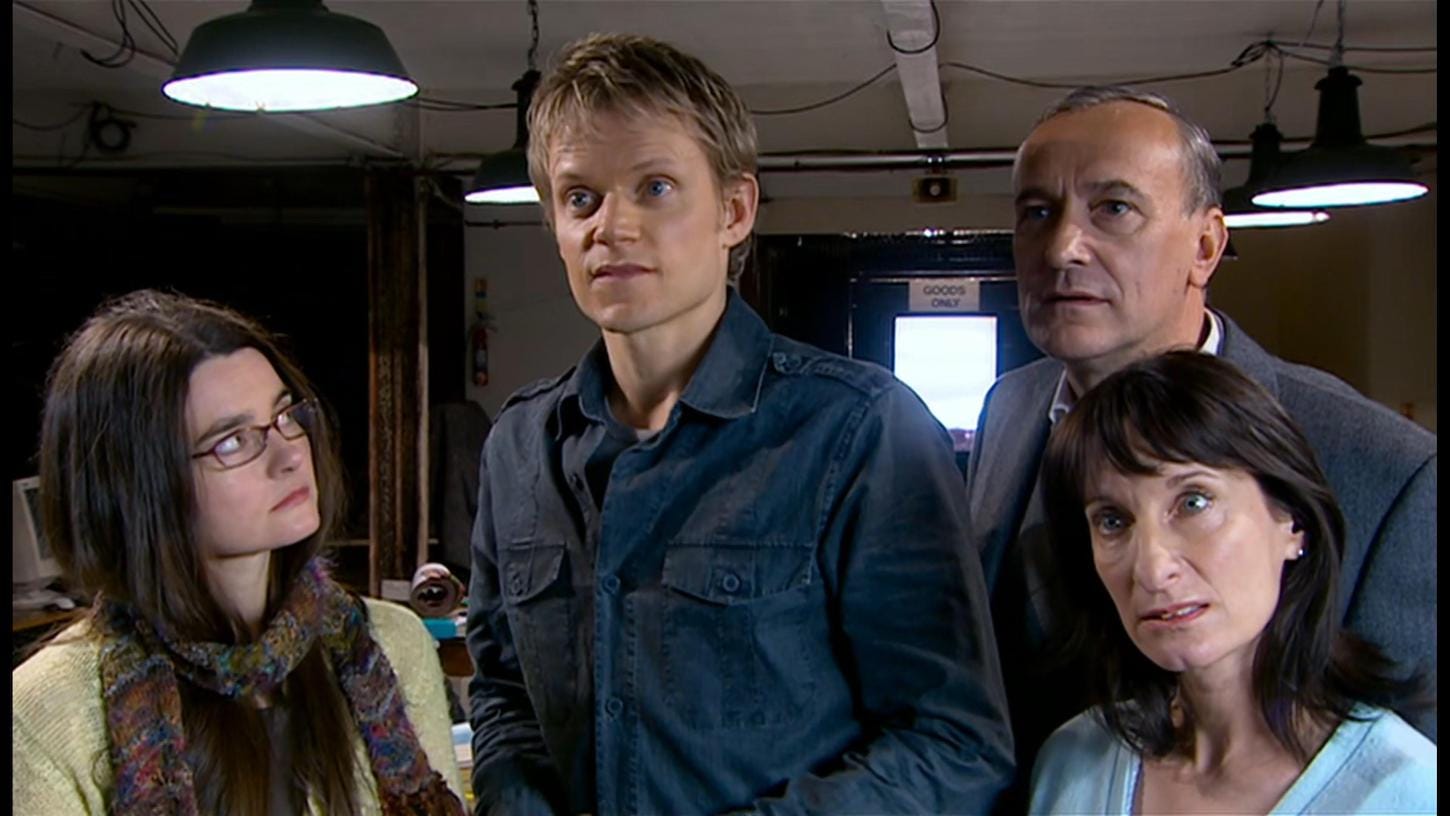
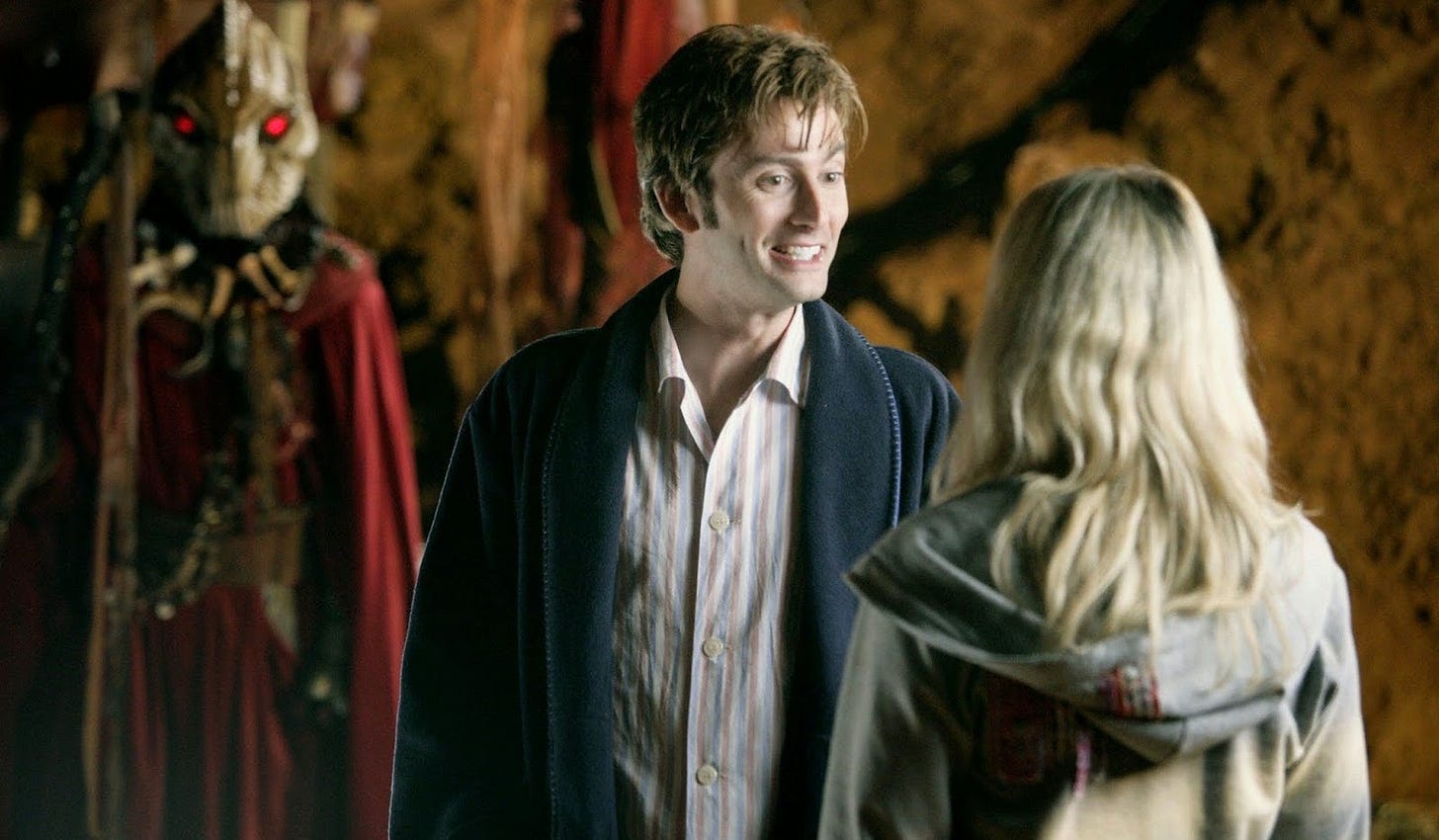
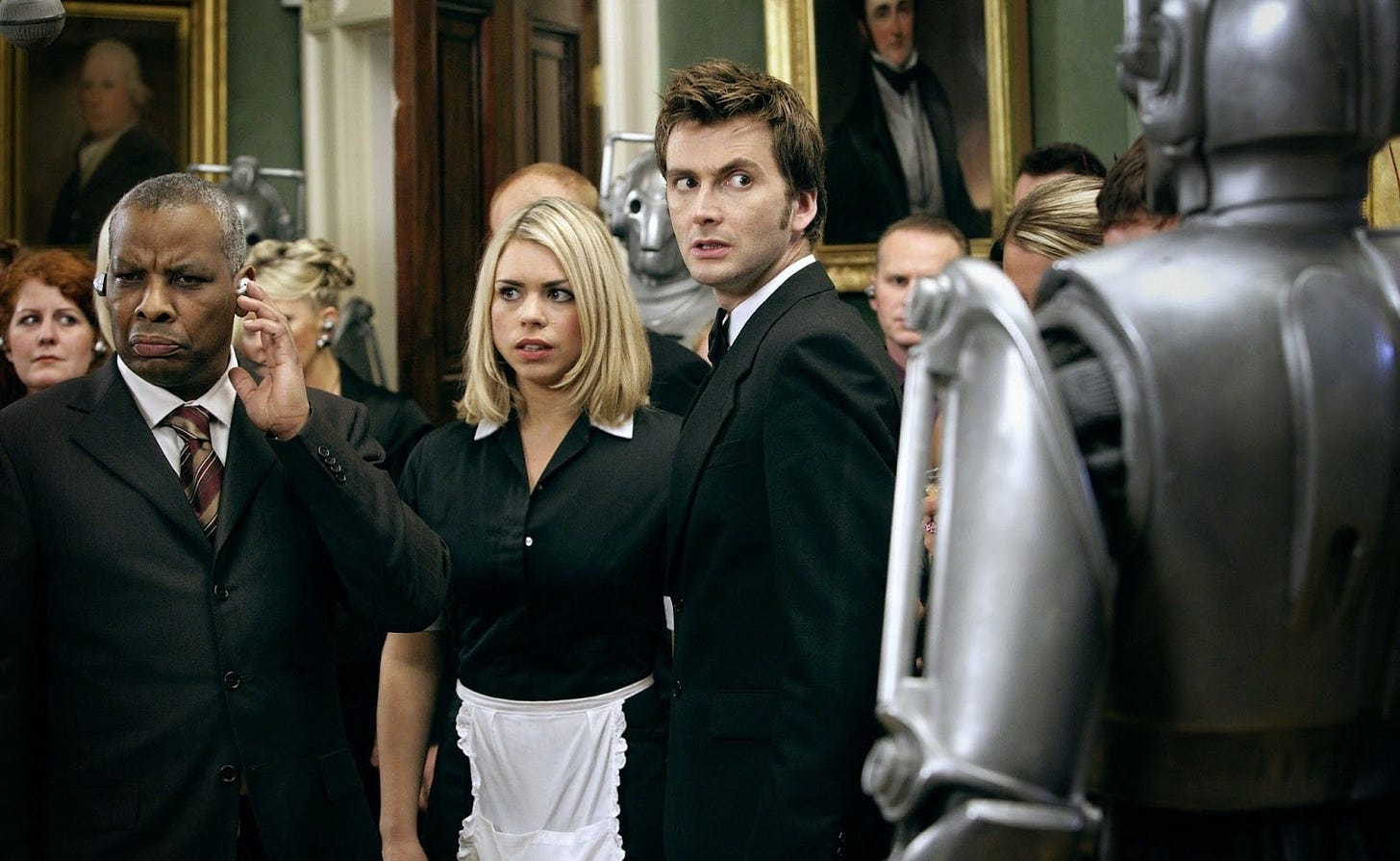
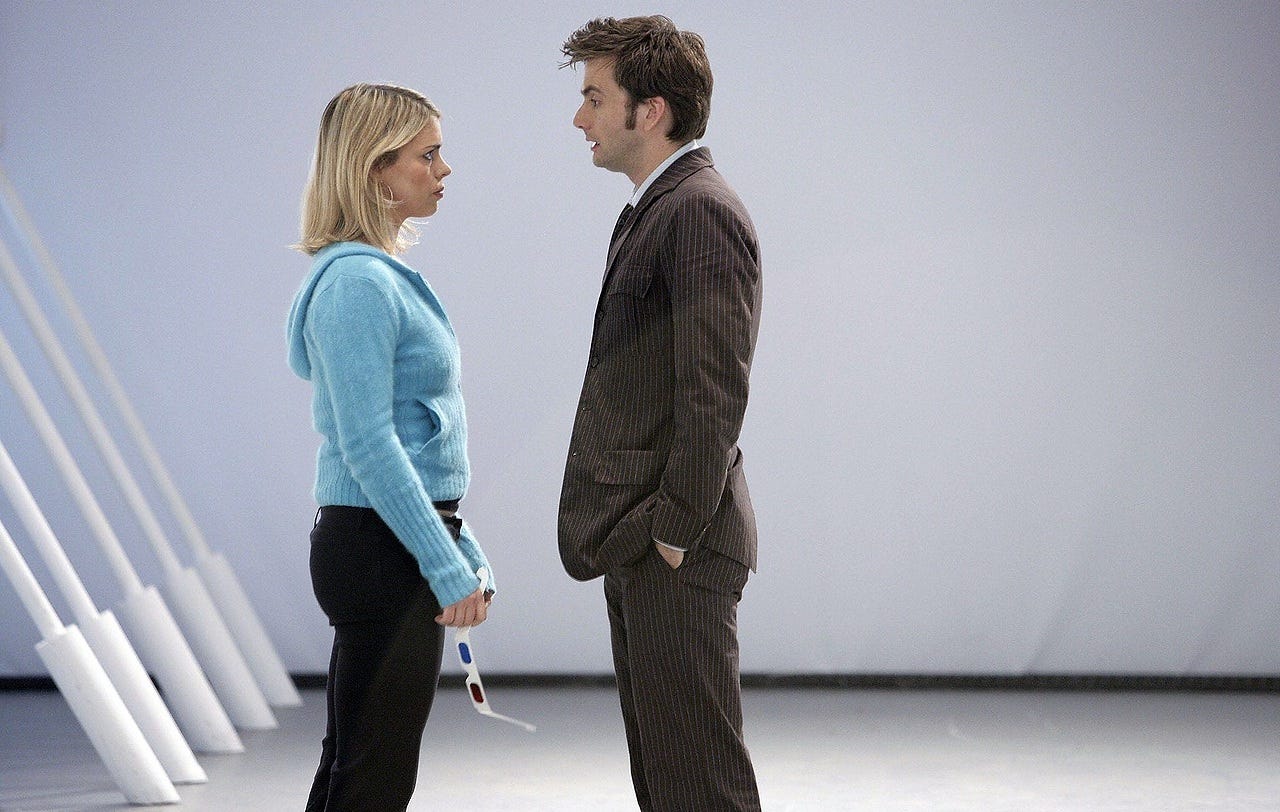
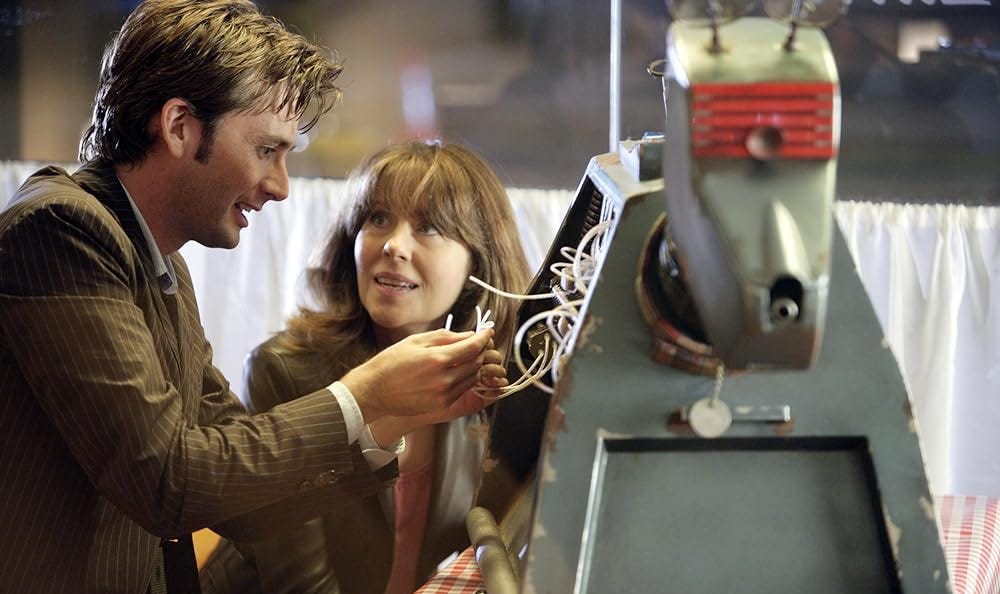
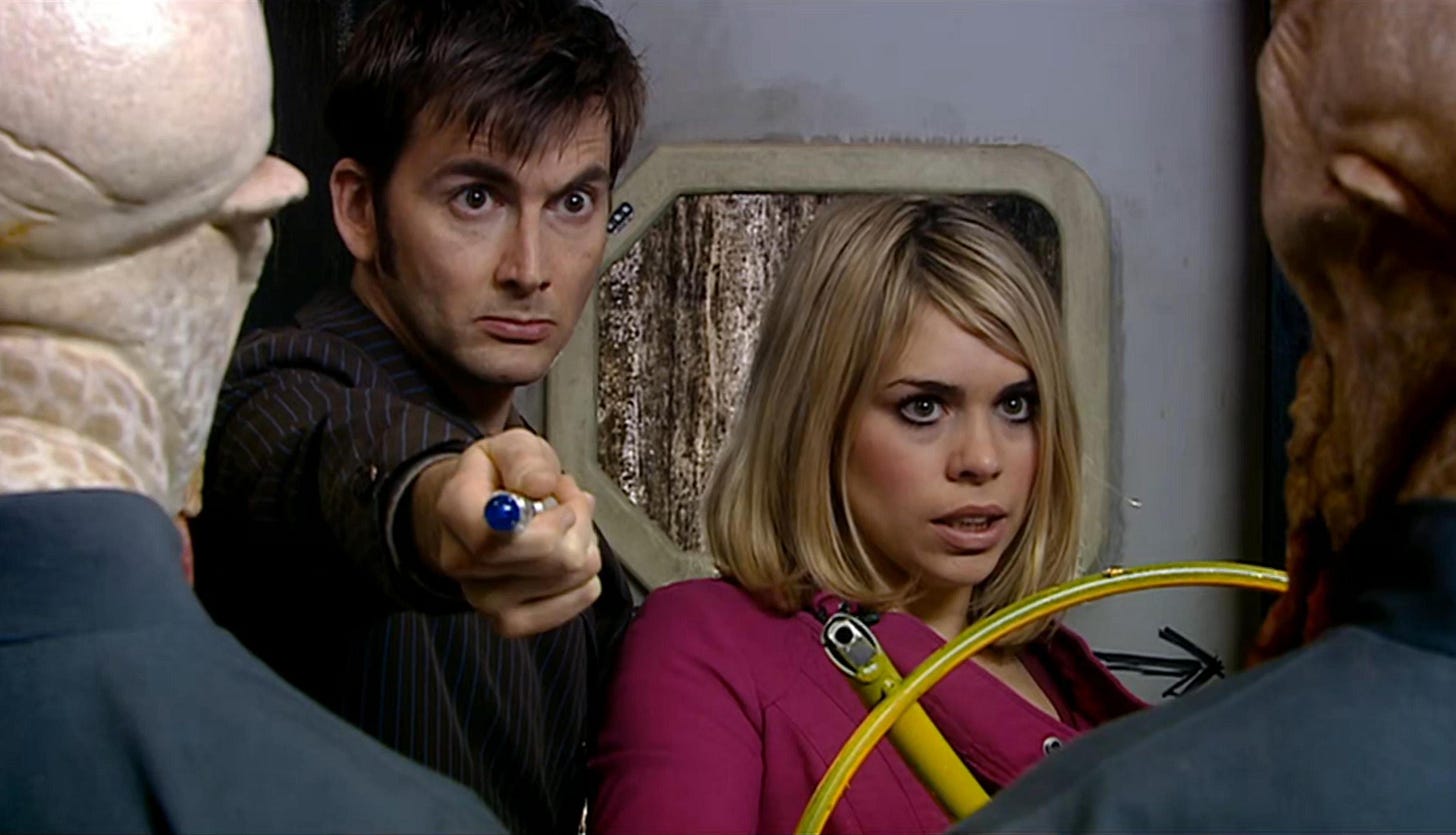
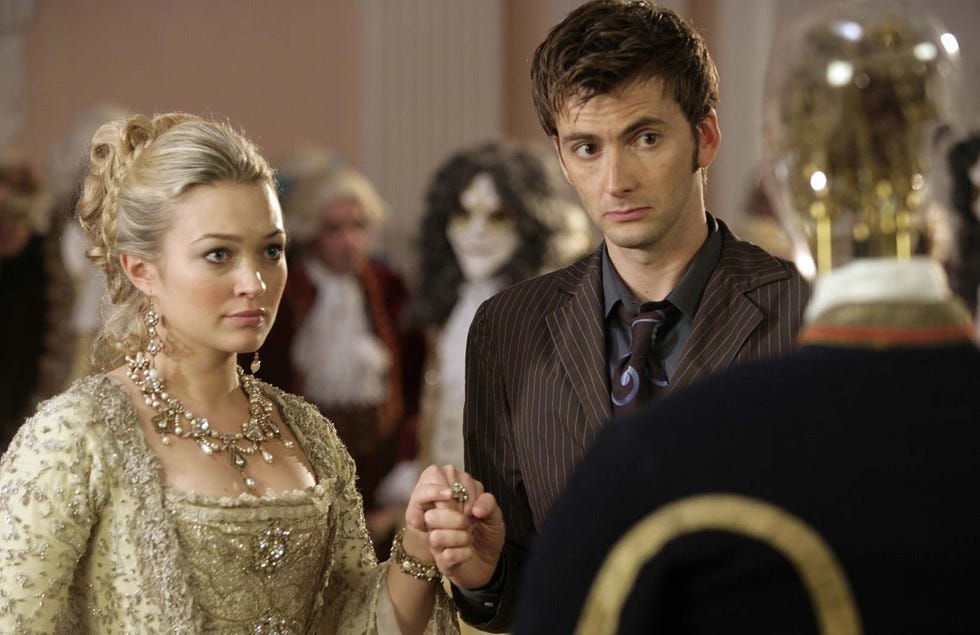
I also find that billie and davids chemistry isnt so much forced but they show their love more then nine and rose. Nine in general was subtle with his emotions whilst tens shows his (i could also write an essay on how ten got so many traits from Rose there was actually a scene they cut to show why ten had rose’s accent) but i love both doctors with rose but they both serve their purpose for one another
not fear her last! i love that episode its not great but i find the way it handles abuse within the home great! the way the mother doesnt talk about it effects the daughter. Someone stated once that s3 and s4 would not have worked without s2 bc ten is essentially a puppy dog with rose; he is born out of love for her so loosing her is what brings back that darker aspects of the doctor